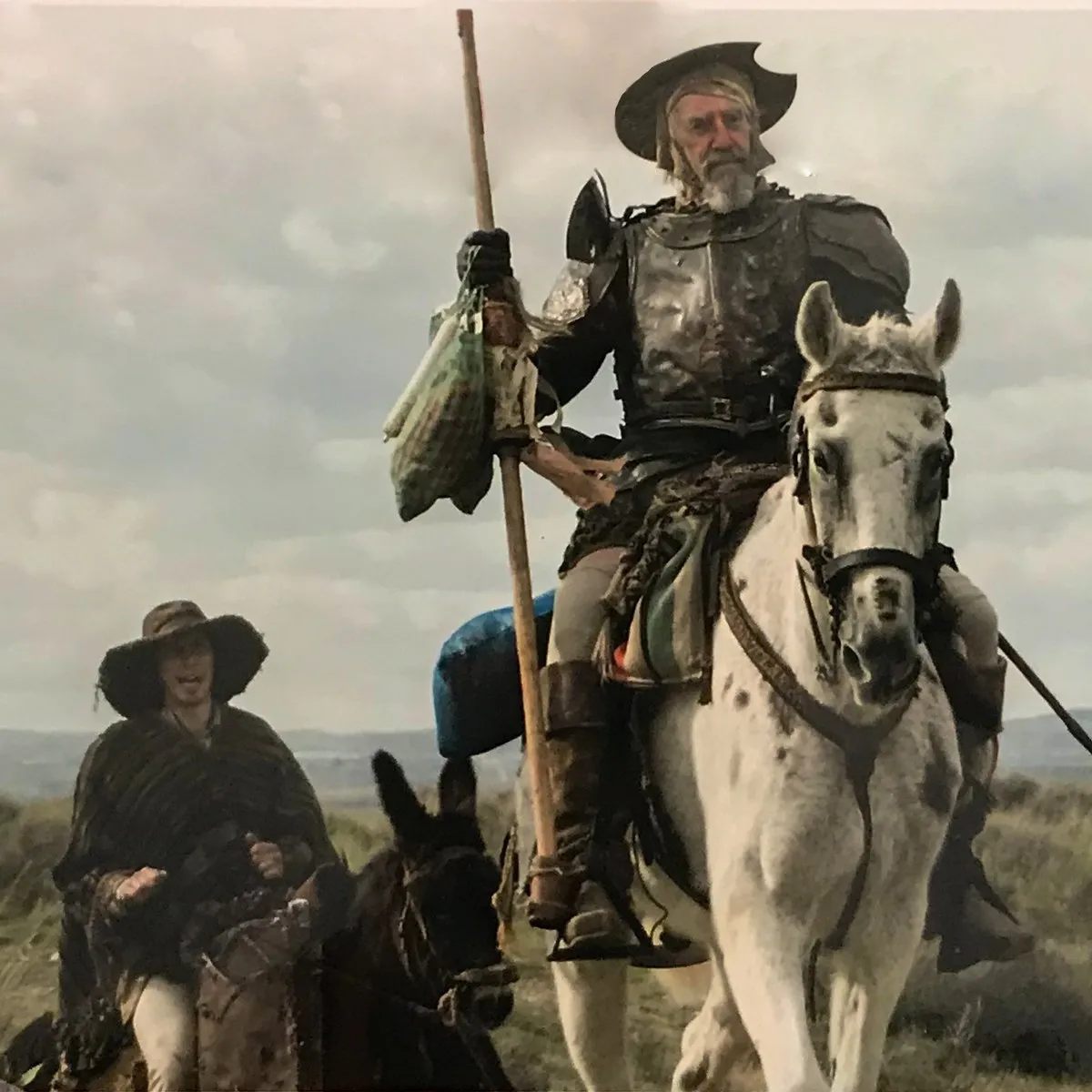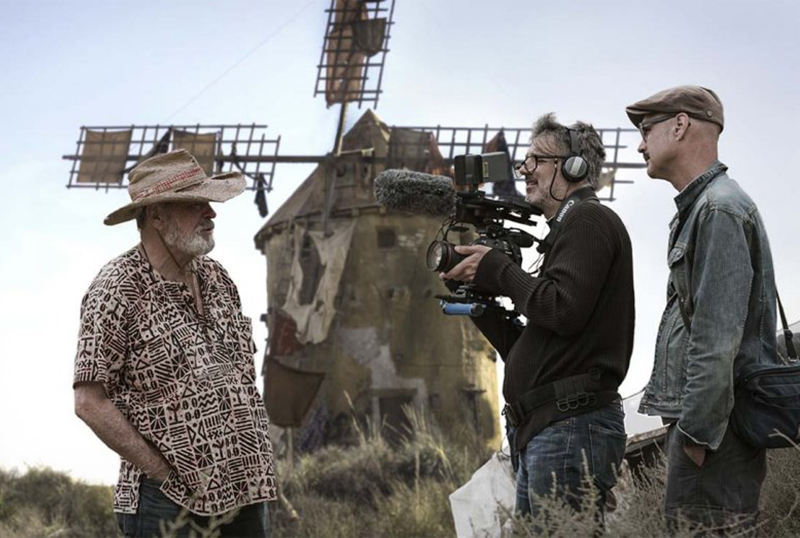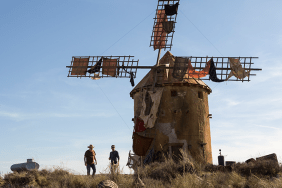ComingSoon.net got the opportunity to talk to filmmakers Keith Fulton and Louis Pepe to discuss their upcoming documentary He Dreams of Giants, a chronicling of the making of Terry Gilliam’s long-gestated The Man Who Killed Don Quixote. The film acts as a sequel to the duo’s previous documentary Lost in La Mancha, which explored Gilliam’s first attempt at making the film in 2000 when Johnny Depp was set as the lead star.
RELATED: CS Interview: Terry Gilliam on The Man Who Killed Don Quixote & More!
Though it seemed like fate the stars would align for Gilliam to finally bring the film, which he had been developing since 1989, to life and for the duo to film a documentary about his success in doing so, they weren’t necessarily keen on diving right back into that world for a follow-up.
“We kind of went into this kicking and screaming a little bit because we’re thinking ‘How are we going to outdo Lost in La Mancha?'” Fulton said. “I think there was trepidation on our part thinking ‘Well, what are we going to do? Will there be any more interest in trying to one-up the last one?’ What we felt early on was that Gilliam was in such an interesting space in terms of his 20 years of expectations around his Quixote film, so there was a really interesting psychological thing going on that was brand new territory to penetrate.”
He Dreams of Giants actually marks the duo’s third deep dive into a Gilliam project that began with a making-of documentary for his celebrated 1995 neo-noir sci-fi thriller 12 Monkeys entitled The Hamster Factor and Other Tales of Twelve Monkeys and La Mancha. Having worked alongside him on both studio and independent projects, the two have coined a “particular paradigm” surrounding both Gilliam and Quixote.
“It was in the editing room on this one that we realized, looking back over the three films that we made about Terry, that The Hamster Factor was very much a man against the system film,” Pepe said. “It was this iconoclastic guy with a lot of energy who says I’m going to try to get away with making a European art film in the Hollywood system with their blessing, and he does. Lost in La Mancha was very much a man against nature film that was the forces of reality showing their power to this insignificant dreamer who’s raging against it and ultimately defeated. When you look at He Dreams of Giants, it’s very much a man against himself. The conflicts in the film are so eternal and really the kind of conflict that only comes with a more mature character who is reflecting back on an entire career.”
This “man against himself” mentality did become apparent on set as filming went on, with Gilliam showing frequent instances of frustration on set, but rather than consider it a feeling of disappointment, Fulton looks towards this behavior as “a state of panic.”
“Imagine that you had a famous documentary made about a failed attempt to make your so-called masterpiece,” Fulton said. “So I think a great deal of what was on his mind was how can he possibly satisfy all these people who’ve been expecting this film for 20 or 30 years. Anybody would feel deep stage fright about that. So I think that’s what he was grappling with. That’s one of the reasons that this is an interesting documentary to continue because you don’t ever see films where artists are grappling with that kind of fear.”
Despite one of the biggest points of interest to the masses for Quixote being the major legal dispute between former producer Paulo Branco and Gilliam over the rights, financing and production on the film, the duo chose to omit this story from their documentary as they felt it didn’t offer anything different from what’s been seen before.
“When we were making The Hamster Factor, we were in our late 20s and the idea of getting to be on a Hollywood movie set and seeing how this hero of ours dealt with the system, that was the thing that we chased,” Pepe said. “When we went to make Lost in La Mancha, we were chasing this idea that Terry had already been working on the film for 10 years, and as filmmakers we were really curious, ‘How does someone muster the energy to keep chasing after something like this?’ But coming to this film, we’re 50 now, so the idea of he’s working with celebrities, okay, we’ve seen that before. ‘Oh, he’s battling with his producer.’ He’s been battling with a producer on every single project, we’re not interested in that.”
“Terry often railed against this thing like, ‘Why aren’t you telling the Paulo Branco story? That’s the story of the film,'” Fulton recalled. “To us, it was like a fly buzzing around the project and just wasn’t very interesting. In a way that wasn’t the central conflict of the film we were making about him, the central conflict was entirely interior to us. It’s not that we were avoiding dredging up legal issues or anything. We tried incorporating those conflicts, but it just didn’t mesh.”
RELATED: 10 Best Terry Gilliam Movies
With all of the time and energy Gilliam devoted to Quixote, there has been fears form fans that the film may be his last, despite no official retirement announcement being made. Pepe certainly hopes the film isn’t his last, while also acknowledging the physical toll it took on him.
“The thing that excites me about Terry is that even if it is the last film that he makes, I know he’s got other creative ventures that he’s working on,” Pepe said. “In the past few decades, he started directing operas. I think he might not make another movie, but he’s definitely not going to stop trying. He says that line about if he’s not making something,’I’m a dead man.’ I believe him because it’s kind of like a distillation of why we create. It’s a kind of life force that he has and is pretty inspiring.”
Though they were on set for the making of both the ill-fated and successful versions of the film, the duo don’t have a preference between the two, mostly because they haven’t seen the finished film.
“We made a conscious choice because one of the things that we felt as we were making our film was that we didn’t want to put forward a worldview of artists and the value of their pursuit being reduced to the value of the end product,” Pepe said. “I think a lot of it comes from our experience between Lost in La Mancha and He Dreams of Giants of making documentaries, the relationship that you have with the subject is kind of a work of art and the film is almost an artifact of that process that hopefully conveys to an audience what the relationship is like.”
The Man Who Killed Don Quixote
-
The Man Who Killed Don Quixote

-
The Man Who Killed Don Quixote

-
The Man Who Killed Don Quixote

-
The Man Who Killed Don Quixote

-
The Man Who Killed Don Quixote

-
The Man Who Killed Don Quixote

-
The Man Who Killed Don Quixote

-
The Man Who Killed Don Quixote

-
The Man Who Killed Don Quixote

-
The Man Who Killed Don Quixote

-
The Man Who Killed Don Quixote

-
The Man Who Killed Don Quixote

-
The Man Who Killed Don Quixote

-
The Man Who Killed Don Quixote

-
The Man Who Killed Don Quixote

-
The Man Who Killed Don Quixote

-
The Man Who Killed Don Quixote

-
The Man Who Killed Don Quixote











